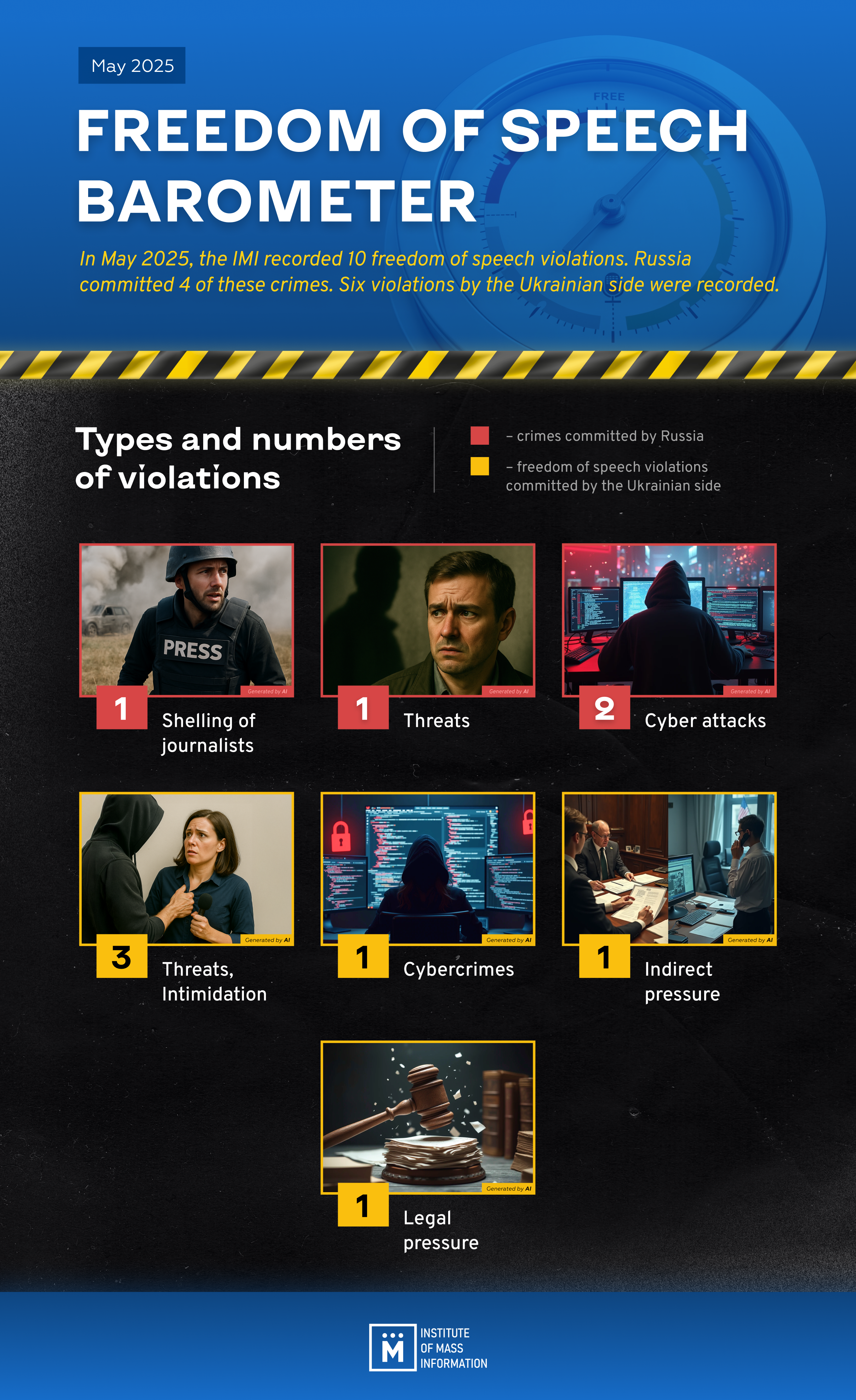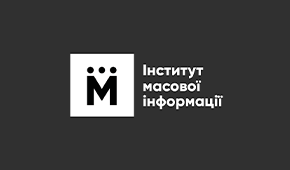IMI records 10 freedom of speech violations in Ukraine in May

The Institute of Mass Information experts recorded 10 freedom of speech violations in Ukraine in May, according to the IMI’s monthly monitoring study “Freedom of Speech Barometer”.
In May, the IMI recorded four crimes against the media and journalists that were committed by Russia. These included shelling strikes and threats to journalists, as well as cyber attacks on media outlets’ websites.
Three media professionals were killed in action in May:
- Vyacheslav Kobrzhytskyi, service member and motorsports commentator with Setanta. His death was reported on May 1, 2025. Killed in action in Donetsk oblast.
- Vasyl Dovbush, former media professional at BC Lux and Channel 24 turned soldier. Killed while performing a combat mission near Mohrytsia (Sumy oblast) on May 6, 2025.
- Bohdan Lysenko, killed in action in Zaporizhzhia oblast on April 13, 2025. His reporting included dozens of articles in both national and regional media outlets such as Fakty, KP v Ukraini, Subota, Ekho.
In May, Russian troops targeted Suspilne Donbas filming crew (chief editor Andriy Kramchenkov and reporter Vladyslav Ukolov) with a drone as they were recording an interview in Rodynske village (Donetsk oblast). The media workers were wearing black bulletproof vests and “Press” badges. They were unharmed.

Freedom of speech violations in Ukraine in May 2025
Serhiy Horbatenko, a war reporter with the Radio Liberty project Donbas.Realii, faced violent threats and harassment on pro-Russian Telegram channels in Donetsk oblast following the release of the project’s video commemorating the second anniversary of the Russian occupation of Bakhmut.
Ukrainian Pravda was targeted in a cyber attack: malefactors exploited their service for sending out letters to the UP Club and sent out an email with Russian spam on May 9. In the email sent on behalf of the UP, the Russians greeted Ukrainians on Victory Day, calling the occasion “our common Victory.” The Crimean Tatar Resource Center website for tracking Russia’s crimes was hacked as well. The incident occurred on the eve of the Day of Remembrance of the Victims of the Crimean Tatar Genocide, which is celebrated on May 18. The organization said that the website posted articles telling the truth about the crimes committed against the Crimean Tatar people and informed the world about the current repression in the occupied Crimea.
The IMI also recorded six freedom of speech violations not related to Russia’s war against Ukraine. These included death threats, indirect and legal pressure, and cyber attacks.
Threats were reported by:
- Vilne Radio, a media outlet relocated from Bakhmut (Donetsk oblast): by the Kyiv City Military Administration spokesperson Yevhen Iyevlev. The official responded to an article about the 2024 profits of Donetsk oblast enlistment centers’ employees, including Iyevlev’s father. Iyevlev used obscene language to refer to the author of the article and threatened to “smash his face in”.
- Hromadske Radio host Maryana Chorniyevych: she received a threatening email following the livestream of the program “That Same Morning”, which discussed the Ukrainians' attitudes to May 9 and the way the topic of World War II is handled in schools. The cyber police identified the man who had sent the threats as a Russia supporter living in Ukraine’s occupied territories.
- Journalists with the Mykolaiv-based media outlet MykVisti, who were threatened by a man armed with a gun while filming the progress of historic building renovations in a Mykolaiv neighborhood on May 26. The man explained to the police that he believes reporters to be sabotage agents helping Russian troops aim their strikes by taking photographs of buildings. The journalists decided not to file a crime statement.
Rivnenski Novyny has released another article smearing the investigative journalism agency Chetverta Vlada and its chief editor Volodymyr Torbich. The news story hurls several insults at Chetverta Vlada, calling them a “tabloid” and a “mickey-mouse outfit”. The website also attacked Volodymyr Torbich's character, accusing him of contempt for the troops and of exploiting army crowdfunding campaigns to raise funds for the media outlet, and calling him a “pookie”.
Syla Pravdy reported that Viktor Humeniuk, director of the municipal enterprise Lutskvodokanal who has been featured in their articles, is trying to trademark the name of their outlet. The official filed the brand registration application with the Ukrainian National Office of Intellectual Property and Innovations in July 2024. The team reached out to Humeniuk asking why he needed a trademark with that name and whether this was an attempt to hinder the work of journalists or retaliation for Syla Pravdy's critical reporting. After a pause, the official replied to all three questions with one phrase: “Thank you”.
LIGA.net website sustained a mass DDoS attack on May 12. The attack targeted the column by strategic communications consultant Nadia Pototska which discussed the value gaps in Ukrainian society in view of the conflict sparked by blogger Anna Alkhim. Nadia Pototska analyzed the scandal surrounding blogger Anna Alkhim, seeing it as a manifestation of a deeper value-based conflict in Ukrainian society. She stressed that language and consuming Russian content have become markers of identity and attitudes towards the war and that publicity implies accountability.
Read the full monitoring study here.
The Institute of Mass Information (IMI) is a Ukrainian non-governmental media organization that has been operating since 1996. The IMI defends the rights of journalists, analyzes the media field and covers media-related events, fights propaganda and disinformation and has been providing media outlets with safety gear for trips to the combat zone since the start of the Russo–Ukrainian war in 2014.
The IMI carries out Ukraine's only freedom of speech monitoring and keeps a list of high quality and sustainable online media outlets, documents Russia's crimes against the media committed in the course of the war on Ukraine. The IMI has representatives in 20 oblasts of Ukraine and a network of "Mediabaza" hubs to provide journalists with continuous support. The IMI's partners include Reporters Without Borders and Freedom House; the organization is a member of the International Organization for the Protection of Freedom of Expression (IFEX).
Help us be even more cool!

